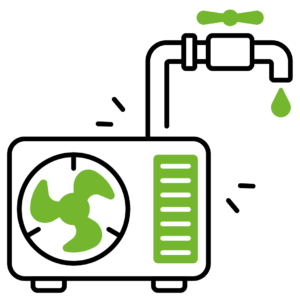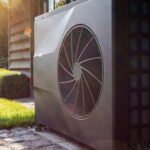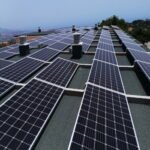
 Excellence in Heat Pumps for Over 15 Years At Solares Energies, we understand that a swimming pool is more than just a luxury; it’s a part of your lifestyle. Located in the heart of Southern Spain, with vibrant offices in Marbella, Malaga, and Pueblo Nuevo near Sotogrande in Cadiz, we are the region’s #1 supplier and installer of premium swimming pool heat pumps. With over 15 years of dedicated experience, our team is committed to enhancing your pool experience all year round.
Excellence in Heat Pumps for Over 15 Years At Solares Energies, we understand that a swimming pool is more than just a luxury; it’s a part of your lifestyle. Located in the heart of Southern Spain, with vibrant offices in Marbella, Malaga, and Pueblo Nuevo near Sotogrande in Cadiz, we are the region’s #1 supplier and installer of premium swimming pool heat pumps. With over 15 years of dedicated experience, our team is committed to enhancing your pool experience all year round.![]() Customised Solutions: Every pool is unique, and so are your needs. Our experts meticulously assess your requirements to provide a tailored heat pump solution that aligns perfectly with your pool’s dimensions and your personal preferences.
Customised Solutions: Every pool is unique, and so are your needs. Our experts meticulously assess your requirements to provide a tailored heat pump solution that aligns perfectly with your pool’s dimensions and your personal preferences.
![]() State-of-the-Art Technology: We harness the latest advancements in heat pump technology to ensure optimal energy efficiency and longevity. This means lower energy bills and a reduced carbon footprint for your home.
State-of-the-Art Technology: We harness the latest advancements in heat pump technology to ensure optimal energy efficiency and longevity. This means lower energy bills and a reduced carbon footprint for your home.
![]() Professional Installation: Our certified technicians ensure a seamless installation process with minimal disruption to your daily life. We pride ourselves on a clean, fast, and efficient installation that respects your time and property.
Professional Installation: Our certified technicians ensure a seamless installation process with minimal disruption to your daily life. We pride ourselves on a clean, fast, and efficient installation that respects your time and property.
![]() Unmatched Expertise: With a rich history spanning over a decade and a half, our team possesses the knowledge and skills to handle every aspect of swimming pool heating with unmatched precision.
Unmatched Expertise: With a rich history spanning over a decade and a half, our team possesses the knowledge and skills to handle every aspect of swimming pool heating with unmatched precision.
![]() Customer-Centric Approach: At Solares Energies, your satisfaction is our top priority. We go above and beyond to ensure that our services not only meet but exceed your expectations.
Customer-Centric Approach: At Solares Energies, your satisfaction is our top priority. We go above and beyond to ensure that our services not only meet but exceed your expectations.
![]() Comprehensive Support: From the initial consultation to post-installation maintenance, we stand by you every step of the way. Our customer service team is always ready to assist with any queries or concerns.
Comprehensive Support: From the initial consultation to post-installation maintenance, we stand by you every step of the way. Our customer service team is always ready to assist with any queries or concerns.
Embark on a journey towards an unparalleled swimming pool experience with Solares Energies. Visit our offices in Marbella, Malaga, and Pueblo Nuevo, or reach out to us through our website or contact number. Let’s make your dream of a perfect year-round pool a reality!
Swimming Pool Heat Pump Systems: At Solares Energies, we’re not just about heating your pool we’re about revolutionising it. Using cutting-edge technology, our swimming pool heat pumps harness the power of the sun, delivering a cost-effective, eco-friendly solution to traditional heating methods. Embrace sustainability without sacrificing comfort, and enjoy the luxury of your pool, tailored to your ideal temperature year-round.
A swimming pool heat pump is an energy-efficient device designed to regulate the temperature of pool water. It operates by transferring heat from the surrounding air into the pool, rather than generating heat on its own. Here’s how it works:
This method of heating is notably efficient and eco-friendly. Unlike traditional gas heaters that burn fuel, heat pumps simply move existing heat, using a small amount of electricity.
This not only makes them more sustainable but also cost-effective in the long run. They are particularly suitable for climates where the average temperature remains above 50°F, as their efficiency decreases in cooler temperatures.
Heat pumps are an ideal solution for those looking to extend their swimming season, reduce their carbon footprint, and save on energy costs.
Swimming Pool Heaters: Imagine a perfect summer day with the sun shining down on your sparkling, clean inground swimming pool. You’re ready to dive in, but as you dip your toe in, you realise the water is ice cold. This common issue for pool owners can be easily solved with the right swimming pool heater. At Solares Energies, we specialise in providing the best heating solutions for your pool. Let’s explore the types of swimming pool heaters available:
How They Work: Solar pool heaters use solar panels to absorb heat and energy from the sun, transferring it to your pool water.
Pros: Eco-friendly, low operational costs, minimal maintenance, and can increase home value.
Cons: Higher initial costs, slower heating process, space requirements for panels.
Ideal For: Homes with ample roof space and consistent sunlight.
How They Work: These heaters warm water by burning natural gas or propane in a combustion chamber.
Pros: Fast heating, lower installation costs, suitable for both inground and above-ground pools.
Cons: Higher operational costs, shorter lifespan, higher emissions.
Ideal For: Quick heating needs and where gas lines are available.
How They Work: These pumps pull warm air from the outside, using it to heat the pool water efficiently.
Pros: Energy-efficient, lower carbon emissions, lower operational costs compared to electric resistance heaters, and long-lasting.
Cons: Higher initial costs, requires a dedicated outlet, slower heating process.
Ideal For: Consistent heating needs and eco-conscious pool owners.
How They Work: They use electricity to heat resistance coils, which in turn heat the water.
Pros: Lower installation costs, no gas emissions, suitable for small pools.
Cons: High operational costs, not ideal for large pools or cooler climates.
Ideal For: Small pools in warmer regions.
In addition to these heating systems, consider using solar blankets or pool covers. They can increase your pool’s temperature and reduce evaporation, enhancing the efficiency of your chosen heating system.
Heat Pump Systems: At Solares Energies, we’re not just experts in swimming pool heat pumps; we’re leaders in transforming your pool experience. Our reputation as the #1 supplier and installer in Southern Spain is built on a foundation of trust, innovation, and customer satisfaction. Here’s why Solares Energies stands out as your ideal choice:
With years of dedicated service in the industry, our team possesses unmatched knowledge and skills in swimming pool heating solutions. Our experience ensures that every project is handled with the utmost professionalism and technical proficiency.
Cutting-Edge Technology: We stay ahead of the curve by utilising the latest advancements in heat pump technology. Our products are not only efficient and eco-friendly but also ensure long-term cost savings and reliability.
Customised Solutions: Understanding that every pool and customer need is unique, we specialise in providing tailored heating solutions. Whether it’s a cosy family pool or a luxurious spa facility, we ensure the right fit for every scenario.
Exceptional Customer Service: Your satisfaction is our priority. From the initial consultation to after-sales support, our team is committed to providing exceptional service. We believe in building lasting relationships with our clients, ensuring their comfort and happiness with every interaction.
![]() Written By:
Written By:
Wesley Lally
![]() Updated on:
Updated on:
07th May 2024

 Other Pumps & Heater Systems
Other Pumps & Heater Systems Other Products & Services
Other Products & Services



 Solares Energies, the foremost swimming pool heat pump provider in Southern Spain, offers a cutting-edge solution for pool owners. Our heat pumps are renowned for their exceptional energy efficiency, making them an environmentally conscious choice. By harnessing the ambient warmth of the surroundings, these heat pumps can maintain comfortable water temperatures, extending your swimming season throughout the year.
Solares Energies, the foremost swimming pool heat pump provider in Southern Spain, offers a cutting-edge solution for pool owners. Our heat pumps are renowned for their exceptional energy efficiency, making them an environmentally conscious choice. By harnessing the ambient warmth of the surroundings, these heat pumps can maintain comfortable water temperatures, extending your swimming season throughout the year.
Solares Energies heat pumps are eco-friendly, with minimal greenhouse gas emissions, aligning perfectly with the region’s focus on sustainability. Choosing our swimming pool heat pump means embracing both luxury and environmental responsibility.
While Solares Energies swimming pool heat pumps offer numerous advantages, it’s essential to consider a few aspects. Initially, there may be a slightly higher upfront cost compared to some alternative heating methods. Nevertheless, the long-term energy savings typically outweigh this initial investment. Additionally, heat pumps rely on electricity for operation, which may lead to increased electricity bills.
However, our team of experts at Solares Energies can guide you in optimising your heat pump system for efficiency. Finally, while heat pumps excel in moderately cold climates like Southern Spain, they may be less effective in extremely cold regions, where alternative heating solutions may be more suitable.
Please see the complete list of Advantages and Disadvantages of Swimming Pool Heat Pumps
![]() Energy Efficiency: Swimming pool heat pumps are highly energy-efficient, with a Coefficient of Performance (COP) typically ranging from 5 to 7. This means they provide 5 to 7 units of heat for every unit of electricity consumed.
Energy Efficiency: Swimming pool heat pumps are highly energy-efficient, with a Coefficient of Performance (COP) typically ranging from 5 to 7. This means they provide 5 to 7 units of heat for every unit of electricity consumed.
![]() Extended Swimming Season: Heat pumps can maintain comfortable water temperatures, allowing you to enjoy your pool for an extended season, even in cooler months.
Extended Swimming Season: Heat pumps can maintain comfortable water temperatures, allowing you to enjoy your pool for an extended season, even in cooler months.
![]() Eco-Friendly: They are considered environmentally friendly because they do not produce direct emissions or use fossil fuels, resulting in a lower carbon footprint compared to gas heaters.
Eco-Friendly: They are considered environmentally friendly because they do not produce direct emissions or use fossil fuels, resulting in a lower carbon footprint compared to gas heaters.
![]() Cost-Effective in the Long Run: While the initial investment can be relatively high, swimming pool heat pumps often result in long-term energy savings and reduced heating costs, making them cost-effective over time.
Cost-Effective in the Long Run: While the initial investment can be relatively high, swimming pool heat pumps often result in long-term energy savings and reduced heating costs, making them cost-effective over time.
![]() Low Maintenance: Heat pumps require minimal maintenance, with most upkeep involving routine cleaning and occasional inspections, reducing ongoing maintenance costs.
Low Maintenance: Heat pumps require minimal maintenance, with most upkeep involving routine cleaning and occasional inspections, reducing ongoing maintenance costs.
![]() Consistent Temperature: They provide consistent water temperature, ensuring a comfortable and enjoyable swimming experience for pool owners and guests.
Consistent Temperature: They provide consistent water temperature, ensuring a comfortable and enjoyable swimming experience for pool owners and guests.
![]() Quiet Operation: Modern swimming pool heat pumps are designed for quiet operation, minimising noise disturbances while in use.
Quiet Operation: Modern swimming pool heat pumps are designed for quiet operation, minimising noise disturbances while in use.
![]() Versatility: Heat pumps can both heat and cool the pool water, providing temperature control year-round, which is especially beneficial in regions with hot summers.
Versatility: Heat pumps can both heat and cool the pool water, providing temperature control year-round, which is especially beneficial in regions with hot summers.
![]() Initial Cost: The upfront cost of purchasing and installing a swimming pool heat pump can be relatively high, making it a significant investment.
Initial Cost: The upfront cost of purchasing and installing a swimming pool heat pump can be relatively high, making it a significant investment.
![]() Electricity Consumption: Heat pumps rely on electricity for operation, which can lead to increased electricity bills, especially during peak usage periods.
Electricity Consumption: Heat pumps rely on electricity for operation, which can lead to increased electricity bills, especially during peak usage periods.
![]() Climate Dependence: They are most effective in moderate climates and may be less efficient in extremely cold regions, as they rely on the ambient air temperature for heat exchange.
Climate Dependence: They are most effective in moderate climates and may be less efficient in extremely cold regions, as they rely on the ambient air temperature for heat exchange.
![]() Installation Space: Heat pumps require adequate installation space, which may be a limitation for pool owners with limited space around the pool area.
Installation Space: Heat pumps require adequate installation space, which may be a limitation for pool owners with limited space around the pool area.
![]() Performance Variability: The effectiveness of a heat pump can vary depending on factors like air temperature, humidity, and pool size, requiring careful system sizing and setup for optimal performance.
Performance Variability: The effectiveness of a heat pump can vary depending on factors like air temperature, humidity, and pool size, requiring careful system sizing and setup for optimal performance.
![]() Initial Warm-Up Time: Heat pumps may take some time to initially warm up the pool water, which can be a drawback for those looking for quick heating.
Initial Warm-Up Time: Heat pumps may take some time to initially warm up the pool water, which can be a drawback for those looking for quick heating.
Abundant Advantages: From substantial energy savings and lower running costs to eco-friendly operations, learn how swimming pool heat pumps offer a plethora of benefits. These advantages and disadvantages should show you how the few downsides, like initial investment and installation considerations, are minor compared to the multitude of positive impacts.
 Solares Energies has a full range of renewable energy products available for the home or business. If you would like to learn more please navigate to our “Renewable Energy Products and Services Page” or complete the “GET A QUOTE” enquiry form at the top of this page and an experienced engineer will call you back, at a time best suited to you.
Solares Energies has a full range of renewable energy products available for the home or business. If you would like to learn more please navigate to our “Renewable Energy Products and Services Page” or complete the “GET A QUOTE” enquiry form at the top of this page and an experienced engineer will call you back, at a time best suited to you.




We supply, install and maintain solar panel systems and solar battery storage.
Improve energy efficiency and reduce your carbon footprint by installing an electric boiler.
We supply, install and maintain underfloor heating and cooling systems.
We supply, install and maintain uPVC windows and doors as well as double-glazing and composite doors.
User solar thermal as a renewable resource to heat up your household water supply.
Electric vehicle chargers supplied, installed and maintained by Solares Energies.
We supply, install and maintain heat pump systems. Reduce your carbon footprint.
Air conditioning systems supplied, installed and maintained by Solares Energies.
Sadly many companies throughout Spain are not qualified or experienced in, supplying and installing Swimming Poll Heaters and Pumps. Solares Energies has a wealth of knowledge and experience in supplying, installing and maintaining boiler systems. We have a dedicated team of electricians, gas fitters, plumbers and heating engineers based throughout Malaga and Cadiz, including Marbella, Estepona, Benalmadena, Manilva, Sotogrande and San Roque in Cadiz.
© 2024 SOLARES ENERGIES ALL RIGHTS RESERVED POWERED BY MINUS 5 MEDIA & DIGITAL MARKETING AGENCY.ES
